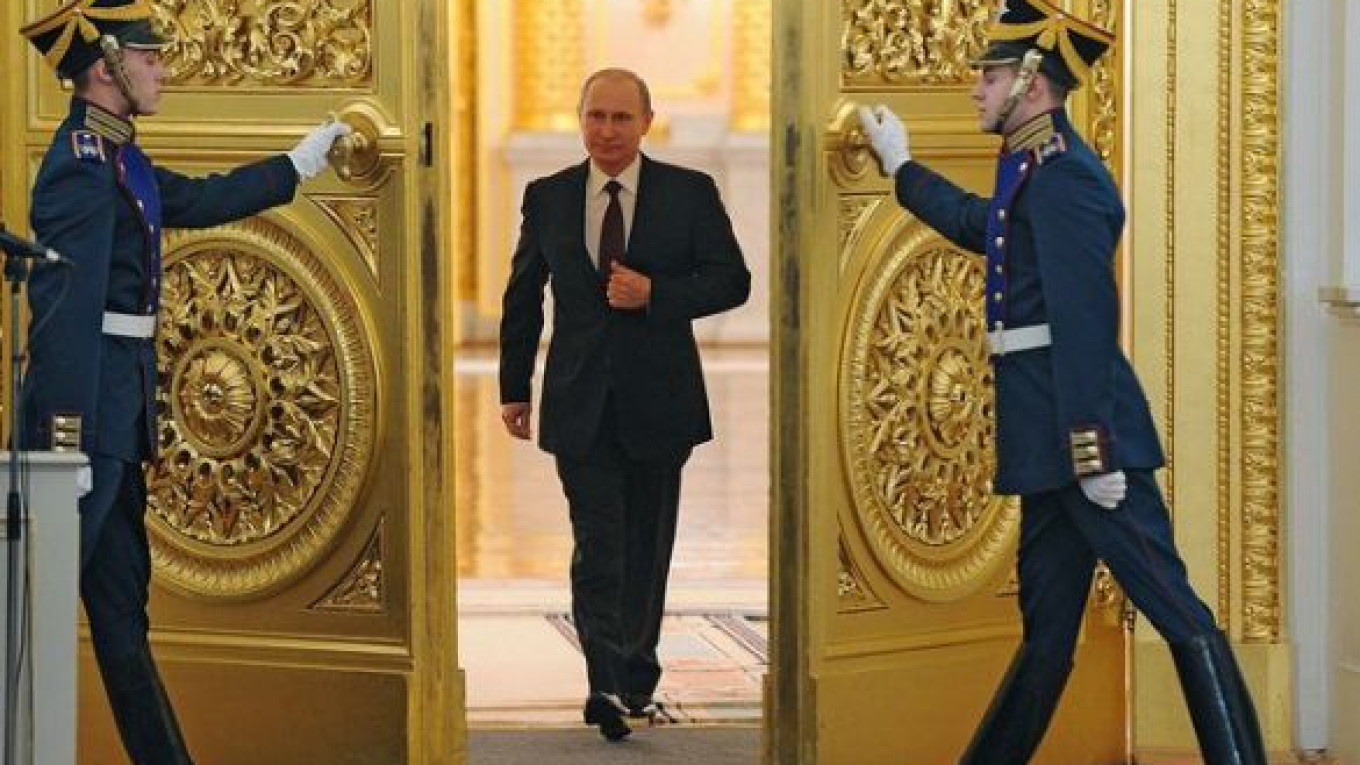British newspaper The Times has named President Vladimir Putin its "International Person of the Year" for 2013, topping off a year that saw the Russian president's every move inspire intense scrutiny and divided opinions at home and abroad.
Putin's crowning diplomatic success was the prevention of U.S. military intervention in Syria, the newspaper said.
In brokering a deal to have the Syrian government surrender its chemical weapons to the United Nations, Putin saved face for the West while becoming, in the eyes of Arab leaders, "the man who knew how to head off Western-led regime change," The Times said.
Putin further promoted Russian influence by successfully wooing Ukraine away from economic integration with the European Union, a stratagem which culminated in Russia's offer of a $15 billion loan in December while mass protests continued across the former Soviet republic.
The Times also lauded the release of prisoners involved in politically-charged cases such as former oil tycoon Mikhail Khodorkovsky and Pussy Riot activists Nadezhda Tolokonnikova and Maria Alyokhina, all three of whom were set free in the last two weeks.
By way of critique, the newspaper noted that Putin has failed to put an end to terrorism in the Caucasus, a reproach that stings even more after two terrorist attacks in Volgograd killed at least 33 people this week.
This is not the first time the Russian president has been recognized as the globe's most influential person. In 2007, Time Magazine also named Putin its "Person of the Year," making him the first to receive the title since President of the Soviet Union Mikhail Gorbachev in the late 1980s.
"Putin has put his country back on the map," Time managing editor Richard Stengel wrote on the magazine's website at the time.
Meanwhile, domestic public opinion has ascribed him this status for no less than six years running, according to studies by the independent Levada Center, the latest of which was published Saturday.
Twenty-six percent of respondents named Putin "Man of the Year" in 2013, followed at a distance by Defense Minister Sergei Shoigu with 7 percent and a tie for third place between Prime Minister Dmitry Medvedev and NSA leaker Edward Snowden, both with 4 percent of the vote.
Putin's lead is even more substantial when the field is restricted to politicians, with 44 percent of Russians naming him "politician of the year" in 2013, a survey published last week by state pollster VTsIOM found.
Both surveys reported margins of error of 3.4 percent.
Other accolades the president accrued this year include an award in November from the World Russian People's Council, an organization under the aegis of the Russian Orthodox Church.
The head of the Russian Orthodox Church, who also chairs the council, said that the prize was meant to honor Putin's commitment to making Russia "a powerful and strong country that has self-respect and is respected by others," RIA Novosti reported.
There was one award that managed to elude Putin this year, however, much to the dismay of his supporters.
An obscure Russian public academy nominated Putin for the Nobel Peace Prize for his role in averting a U.S. military strike on Syria, but the prize ultimately went instead to the Organization for the Prohibition of Chemical Weapons, or OPCW.
Some Russian lawmakers nonetheless interpreted the Nobel Committee's choice as an indirect nod to Putin's leadership.
A Message from The Moscow Times:
Dear readers,
We are facing unprecedented challenges. Russia's Prosecutor General's Office has designated The Moscow Times as an "undesirable" organization, criminalizing our work and putting our staff at risk of prosecution. This follows our earlier unjust labeling as a "foreign agent."
These actions are direct attempts to silence independent journalism in Russia. The authorities claim our work "discredits the decisions of the Russian leadership." We see things differently: we strive to provide accurate, unbiased reporting on Russia.
We, the journalists of The Moscow Times, refuse to be silenced. But to continue our work, we need your help.
Your support, no matter how small, makes a world of difference. If you can, please support us monthly starting from just $2. It's quick to set up, and every contribution makes a significant impact.
By supporting The Moscow Times, you're defending open, independent journalism in the face of repression. Thank you for standing with us.
Remind me later.


